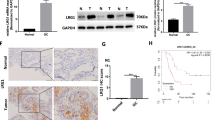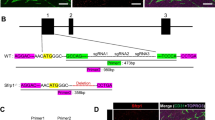Abstract
Hepatocellular carcinoma (HCC) is a common malignant solid tumor characterized by rich vascularization. Pregnancy-specific glycoprotein 9 (PSG9) is a member of the carcinoembryonic antigen (CEA)/PSG family and is produced at high levels during pregnancy. We previously identified PSG9 as an HCC-related protein. However, the expression of PSG9 and its regulation during HCC carcinogenesis remain poorly explored. In the present study, we first found that the levels of PSG9 protein were significantly increased in the plasma of HCC patients. PSG9 overexpression also increased the proliferation ability of an HCC cell line. High expression of PSG9 was associated with angiogenesis by accelerating VEGFA expression. In addition, Cox’s proportional hazards model analysis revealed that the plasma level of PSG9 was an independent prognostic factor for overall survival. We propose that PSG9 is a novel indicator of prognosis in patients with HCC and could serve as a novel therapeutic target for HCC. Furthermore, our results indicate that PSG9 protein may facilitate the development of HCC by fostering angiogenesis via promoting VEGFA production in cancer cells.
Similar content being viewed by others
References
Cao, Y., E, G., Wang, E., Pal, K., Dutta, S.K., Bar-Sagi, D., and Mukhopadhyay, D. (2012). VEGF exerts an angiogenesis-independent function in cancer cells to promote their malignant progression. Cancer Res 72, 3912–3918.
Del Rio, M., Molina, F., Bascoul-Mollevi, C., Copois, V., Bibeau, F., Chalbos, P., Bareil, C., Kramar, A., Salvetat, N., Fraslon, C., Conseiller, E., Granci, V., Leblanc, B., Pau, B., Martineau, P., and Ychou, M. (2007). Gene expression signature in advanced colorectal cancer patients select drugs and response for the use of leucovorin, fluorouracil, and irinotecan. J Clin Oncol 25, 773–780.
El-Assal, O.N., Yamanoi, A., Soda, Y., Yamaguchi, M., Igarashi, M., Yamamoto, A., Nabika, T., and Nagasue, N. (1998). Clinical significance of microvessel density and vascular endothelial growth factor expression in hepatocellular carcinoma and surrounding liver: possible involvement of vascular endothelial growth factor in the angiogenesis of cirrhotic liver. Hepatology 27, 1554–1562.
Ellis, L.M., and Hicklin, D.J. (2008). VEGF-targeted therapy: mechanisms of anti-tumour activity. Nat Rev Cancer 8, 579–591.
Florio, T., Morini, M., Villa, V., Arena, S., Corsaro, A., Thellung, S., Culler, M.D., Pfeffer, U., Noonan, D.M., Schettini, G., and Albini, A. (2003). Somatostatin inhibits tumor angiogenesis and growth via somatostatin receptor-3-mediated regulation of endothelial nitric oxide synthase and mitogen-activated protein kinase activities. Endocrinology 144, 1574–1584.
Folkman, J. (2001). Angiogenesis-dependent diseases. Semin Oncol 28, 536–542.
Ha, C.T., Wu, J.A., Irmak, S., Lisboa, F.A., Dizon, A.M., Warren, J.W., Ergun, S., and Dveksler, G.S. (2010). Human pregnancy specific beta-1- glycoprotein 1 (PSG1) has a potential role in placental vascular morphogenesis. Biol Reprod 83, 27–35.
Jemal, A., Bray, F., Center, M.M., Ferlay, J., Ward, E., and Forman, D. (2011). Global cancer statistics. CA Cancer J Clin 61, 69–90.
Li, M., Xiao, T., Zhang, Y., Feng, L., Lin, D., Liu, Y., Mao, Y., Guo, S., Han, N., Di, X., Zhang, K., Cheng, S., and Gao, Y. (2010). Prognostic significance of matrix metalloproteinase-1 levels in peripheral plasma and tumour tissues of lung cancer patients. Lung Cancer 69, 341–347.
Lisboa, F.A., Warren, J., Sulkowski, G., Aparicio, M., David, G., Zudaire, E., and Dveksler, G.S. (2011). Pregnancy-specific glycoprotein 1 induces endothelial tubulogenesis through interaction with cell surface proteoglycans. J Biol Chem 286, 7577–7586.
Llovet, J.M., Ricci, S., Mazzaferro, V., Hilgard, P., Gane, E., Blanc, J.F., de Oliveira, A.C., Santoro, A., Raoul, J.L., Forner, A., Schwartz, M., Porta, C., Zeuzem, S., Bolondi, L., Greten, T.F., Galle, P.R., Seitz, J.F., Borbath, I., Häussinger, D., Giannaris, T., Shan, M., Moscovici, M., Voliotis, D., Bruix, J., and Bruix, J. (2008). Sorafenib in advanced hepatocellular carcinoma. N Engl J Med 359, 378–390.
Mazzocca, A., Fransvea, E., Lavezzari, G., Antonaci, S., and Giannelli, G. (2009). Inhibition of transforming growth factor β receptor I kinase blocks hepatocellular carcinoma growth through neo-angiogenesis regulation. Hepatology 50, 1140–1151.
Mei, Z., Jiao, H.K., Wang, W., Li, J., Chen, G.Q., and Xu, Y. (2014). Polycomb chromobox 4 enhances migration and pulmonary metastasis of hepatocellular carcinoma cell line MHCC97L. Sci China Life Sci 57, 610–617.
Pang, R., and Poon, R.T.P. (2006). Angiogenesis and antiangiogenic therapy in hepatocellular carcinoma. Cancer Lett 242, 151–167.
Salahshor, S., Goncalves, J., Chetty, R., Gallinger, S., and Woodgett, J.R. (2005). Differential gene expression profile reveals deregulation of pregnancy specific β1 glycoprotein 9 early during colorectal carcinogenesis. BMC Cancer 5, 66.
Sapra, P., Kraft, P., Pastorino, F., Ribatti, D., Dumble, M., Mehlig, M., Wang, M., Ponzoni, M., Greenberger, L.M., and Horak, I.D. (2011). Potent and sustained inhibition of HIF-1α and downstream genes by a polyethyleneglycol-SN38 conjugate, EZN-2208, results in anti-angiogenic effects. Angiogenesis 14, 245–253.
Sasaki, Y., Yamamura, H., Kawakami, Y., Yamada, T., Hiratsuka, M., Kameyama, M., Ohigashi, H., Ishikawa, O., Imaoka, S., Ishiguro, S., and Takahashi, K. (2002). Expression of smooth muscle calponin in tumor vessels of human hepatocellular carcinoma and its possible association with prognosis. Cancer 94, 1777–1786.
Shi, G.M., Ke, A.W., Zhou, J., Wang, X.Y., Xu, Y., Ding, Z.B., Devbhandari, R.P., Huang, X.Y., Qiu, S.J., Shi, Y.H., Dai, Z., Yang, X.R., Yang, G.H., and Fan, J. (2010). CD151 modulates expression of matrix metalloproteinase 9 and promotes neoangiogenesis and progression of hepatocellular carcinoma. Hepatology 52, 183–196.
Snyder, S.K., Wessells, J.L., Waterhouse, R.M., Dveksler, G.S., Wessner, D.H., Wahl, L.M., and Zimmermann, W. (2001). Pregnancy-specific glycoproteins function as immunomodulators by inducing secretion of IL-10, IL-6 and TGF-beta1 by human monocytes. Am J Reprod Immunol 45, 205–216.
Sun, W., Sohal, D., Haller, D.G., Mykulowycz, K., Rosen, M., Soulen, M.C., Caparro, M., Teitelbaum, U.R., Giantonio, B., O’Dwyer, P.J., Shaked, A., Reddy, R., and Olthoff, K. (2011). Phase 2 trial of bevacizumab, capecitabine, and oxaliplatin in treatment of advanced hepatocellular carcinoma. Cancer 117, 3187–3192.
Tseng, P.L., Tai, M.H., Huang, C.C., Wang, C.C., Lin, J.W., Hung, C.H., Chen, C.H., Wang, J.H., Lu, S.N., Lee, C.M., Changchien, C.S., and Hu, T.H. (2008). Overexpression of VEGF is associated with positive p53 immunostaining in hepatocellular carcinoma (HCC) and adverse outcome of HCC patients. J Surg Oncol 98, 349–357.
Vinciguerra, M., Carrozzino, F., Peyrou, M., Carlone, S., Montesano, R., Benelli, R., and Foti, M. (2009). Unsaturated fatty acids promote hepatoma proliferation and progression through downregulation of the tumor suppressor PTEN. J Hepatol 50, 1132–1141.
Xiao, T., Ying, W., Li, L., Hu, Z., Ma, Y., Jiao, L., Ma, J., Cai, Y., Lin, D., Guo, S., Han, N., Di, X., Li, M., Zhang, D., Su, K., Yuan, J., Zheng, H., Gao, M., He, J., Shi, S., Li, W., Xu, N., Zhang, H., Liu, Y., Zhang, K., Gao, Y., Qian, X., and Cheng, S. (2005). An approach to studying lung cancer-related proteins in human blood. Mol Cell Proteomics 4, 1480–1486.
Yang, X.R., Xu, Y., Yu, B., Zhou, J., Qiu, S.J., Shi, G.M., Zhang, B.H., Wu, W.Z., Shi, Y.H., Wu, B., Yang, G.H., Ji, Y., and Fan, J. (2010). High expression levels of putative hepatic stem/progenitor cell biomarkers related to tumour angiogenesis and poor prognosis of hepatocellular carcinoma. Gut 59, 953–962.
Zhang, X., Xiao, T., Cheng, S., Tong, T., and Gao, Y. (2011). Cigarette smoke suppresses the ubiquitin-dependent degradation of OLC1. Biochem Biophys Res Commun 407, 753–757.
Zhao, X., Li, J., Zhuo, J., and Cai, L. (2010). Reexpression of ARHI inhibits tumor growth and angiogenesis and impairs the mTOR/VEGF pathway in hepatocellular carcinoma. Biochem Biophys Res Commun 403, 417–421.
Acknowledgements
This work was supported by the National Natural Science Foundation of China (81172035), National High Technology Research and Development Program of China (2012AA020206), and National Basic Research Program of China (2014CBA02004).
Author information
Authors and Affiliations
Corresponding authors
Additional information
Contributed equally to this work
Rights and permissions
About this article
Cite this article
Rong, W., Yang, L., Yin, L. et al. PSG9 promotes angiogenesis by stimulating VEGFA production and is associated with poor prognosis in hepatocellular carcinoma. Sci. China Life Sci. 60, 528–535 (2017). https://doi.org/10.1007/s11427-016-0226-7
Received:
Accepted:
Published:
Issue Date:
DOI: https://doi.org/10.1007/s11427-016-0226-7




